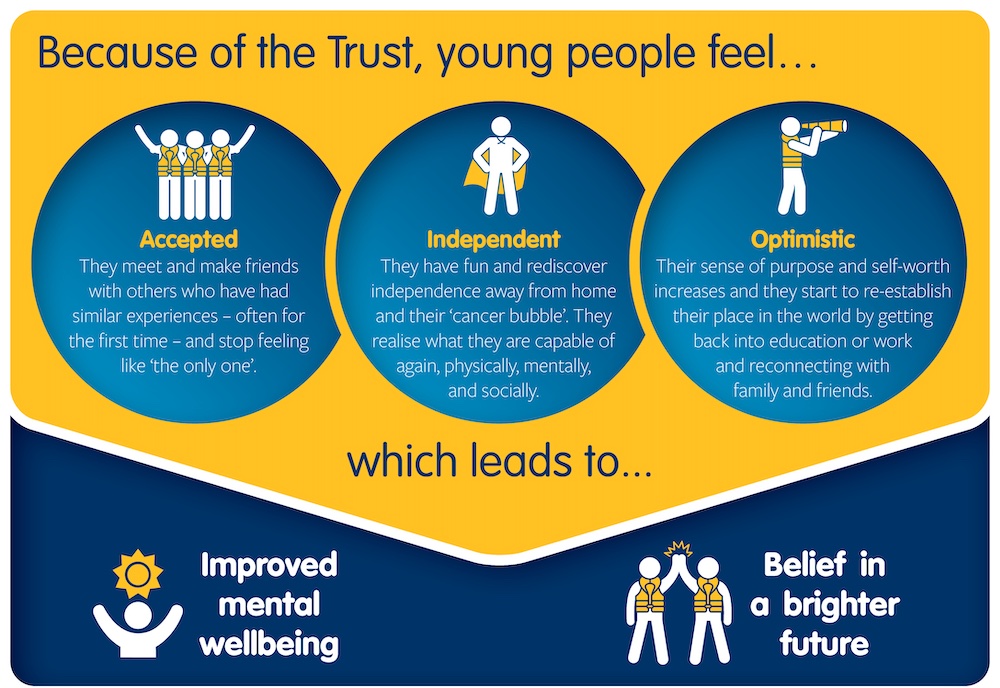The Ellen MacArthur Cancer Trust is a national charity that takes young people aged 8-24 on sailing and outdoor adventures to inspire them to believe in a brighter future living through and beyond cancer.
Happily survival rates are increasing. But what happens after treatment can be as difficult as, if not even more so, than the treatment itself. This is not talked about or is understood as much as it should be.
Young people remain vulnerable after treatment as it comes at a time of rapid physical, emotional and social development.
Cancer in young people often leads to lower educational achievement, relationship and friendship difficulties, body image issues, and/or ongoing late effects, such as extreme fatigue, infertility, osteoporosis, thyroid problems and hearing or vision loss.
Through our free sailing and outdoor adventures, young people laugh, gain a new sense of purpose and self-worth, rediscover independence, and feel optimism for the future.
They realise what they are capable of and stop feeling like ‘the only one’. They start to re-establish their purpose and place in the world and believe in a brighter future.

On the boat some magic happens. It's not really the sailing or the water, but the environment being on a boat creates. It is transformational.
Sailing gives everyone the chance to find out what they’re capable of alongside other young people who completely understand what they’ve been through.
Ellen was just four when she first stepped on a boat, but immediately knew her life would be full of sailing adventures.
What she didn't know then was that she would end up sailing around the world twice, and, in 2005, become the fastest person to ever do that!
Ellen knew sailing could give young people recovering from cancer an amazing opportunity to learn new skills, get out of their comfort zone, get a confidence boost, and gain a sense of independence.
Ellen says she needed a certain element of bravery to deal with whatever situation she found herself in at sea, but thinks true bravery is when people face adversity they didn’t choose, like the young people we support.
Ellen had a dream and never let go of it. It's why her message is clear - ‘Go for it!'
Our ambition is to be even more accessible and inclusive to all young people who have a cancer diagnosis in the UK.
We work with every young person’s principal treatment centre and a growing number of designated units across the UK.
Young people have traditionally learnt about the Trust through our contacts and partners in each of these hospitals or units, usually a nurse, Young Lives vs Cancer Social Worker or Teenage Cancer Trust Youth Support Co-ordinator.
Young people (or their parents/guardians) can sign up for a trip directly, typically through our website, too. This often includes young people who were never in or are no longer part of the system and/or who are experiencing late effects.
Young people also hear about us through other charities or support groups they are involved with or friends who have been on our trips.
If you know someone who is struggling or could do with a bit of support, however long off treatment they are, we would love to hear from them.
As an organisation that supports young people through the power of the outdoors, we recognise the critical importance of preserving our natural resources and ensuring a sustainable future for the planet and the generations to come.
Through our 2023-2025 Ambitions, we have committed to evaluate and reduce the negative impact our trips, fundraising, communications, and team activities have on the planet.
We will do this by reviewing the environmental impact of what we do,
and make sustainable, green choices and decisions on the things in our control.
Publishing our Environmental Sustainability Policy Statement is the first step.
From Dame Ellen MacArthur’s early inspiration to how we got to where we are today.
Being at the wheel, you feel so in control, like you’re finally in the driver’s seat, literally and metaphorically.
If cancer feels like losing control, then learning to sail with others who have been through the same thing feels like taking it back again, says Callum.
Find out more about Callum's Story
Find out more about the trips Support the Trust